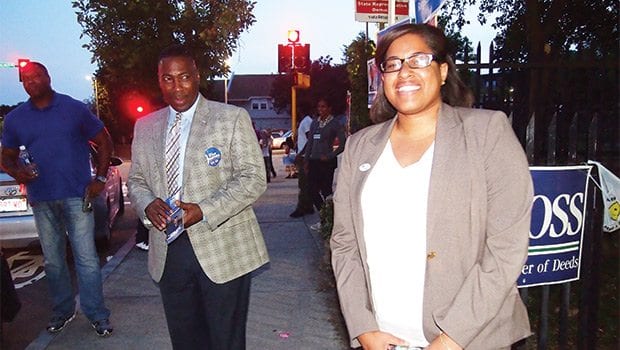A new legislator for Roxbury’s 7th Suffolk
Chynah Tyler wins three-way race by narrow margin

In what was the most hotly-contested legislative race in Boston’s low-turnout state primary, political newcomer Chynah Tyler eked out a narrow victory, with 901 of the 2,061 votes cast in the three-way race. Monica Cannon trailed by 107 votes with 794, and Marydith Tuitt garnered 364 votes.
While turnout in the Roxbury legislative district was light at 11 percent, citywide turnout was even lower at just 9 percent.
In other contested races around the city, 11th Suffolk District incumbent Liz Malia handily defeated challenger Charles Clemmons Muhammad. In the 12th Suffolk District, Dan Cullinane fended off a challenge from attorney Jovan Lacet, and 5th Suffolk District Representative Evandro Carvalho handily defeated challenger Melinda Stewart.

Marydith Tuitt at the Boys and Girls Club polling place on primary day.
Suffolk County Sheriff Steve Tompkins fended off a challenge from Alexander Rhalimi, securing 78 percent of the Boston vote.
Former City Councilor Stephen Murphy won a seven-way race for the Suffolk County Register of Deeds seat, trailed by Katherine Forde and Stephanie Everett. In one of the more closely-watched races, state Sen. Pat Jehlen of Somerville fended off a challenge by Cambridge City Councilor Leland Cheung.
In Springfield, City Councilor Bud Williams won a four-way race for the 11th Hampden District seat currently held by outgoing Rep. Ben Swan, beating Ben Swan Jr., Ken Barnett and Larry Lawson.
Well-capitalized campaigns
The low turnout in the Roxbury race was not likely caused by a lack of campaign activity. The organizations backing Tyler, Cannon and Tuitt were in full swing during the weeks leading up to the Sept. 8 primary. All three maintained field offices, employed teams of volunteers, knocked on doors and mailed literature.
The race was not inexpensive. Tyler raised $22,017 between March, when she first filed with the Office of Campaign and Public Finance, and the August 21 filing deadline. Cannon raised $11,238 between first filing with OCPF in January and August 21. But with charter school expansion on the table in November, the race for the Seventh Suffolk District became another battlefront. As such, the Mass Teachers Association and the network of venture capitalists backing Question 2 appear prominently in OCPF filings.
Cannon opposes charter school expansion. Tyler is in favor of the ballot question.
In addition to receiving a $500 contribution from Voice of Teachers for Education, Cannon benefitted from numerous independent expenditures, including $6,040 the Massachusetts Teachers Association spent on a billboard and $4,246 the union spent on a mailer.
Tyler’s more robust receipts included several thousand-dollar donations from venture capitalists as well as several independent expenditures, including $9,137.54 for a direct mailing from the pro-charter Democrats for Education Reform.
Tuitt, who raised $7,715, did not appear to receive any contribution from pro- or anti-charter expansion supporters.
While the teachers unions and charter backers threw tens of thousands into the Seventh Suffolk, they each spent in the neighborhood of $100,000 on the Jehlen-Cheung race, making that by far the most hotly-contested charter battle since Democrats for Education Reform dropped more than $1.3 million in support of former City Councilor John Connolly’s 2013 mayoral campaign.

City Councilor Tito Jackson and candidate Monica Cannon at the Lewis School. Turnout for the Seventh Suffolk District race was light, at 11 percent of registered voters, but slightly higher than the dismal citywide average of 9 percent.
A single precinct
In the end, the race for the Seventh Suffolk District came down to just over 100 votes. Cannon won five of the twelve precincts in the district, and tied in one with Tyler. Tyler won six. Of those she won, Ward 9, precinct 5 — which runs from Dudley Square to Roxbury Crossing and includes Fort Hill as far south as Cedar Street — delivered the most lopsided victory, with Tyler receiving 234 votes to Cannon’s 99, according to a tally by Tyler’s campaign.
In that single Fort Hill precinct, Tyler secured a 135-vote margin that more than made up for losses in other precincts.
Low turnout conundrum
Local political activists decried the low turnout in last Thursday’s election, which coincided with the first day of school in the Boston public schools. Because many parents drive their child into school on the first day, the city often experiences a higher volume of traffic. Add to that equation the fact that many polling places are in schools, and it makes Secretary of State William Galvin’s decision to hold the primary on Thursday even more puzzling.
“Holding an election on the first day of school has an impact,” said Ward 12 Democratic Committee activist Louis Elisa. “It affects people’s ability to get to work.”
Elisa said the toxic tone in national politics, led by the race-baiting campaign of Donald Trump, also may have turned many away from the polls.
“Nothing that’s happened this year in politics looks good,” he said. “People are becoming cynical and distrustful of the electoral process.”
Sheriff Tompkins, who will not face a Republican challenger in the November 8 general election, said the low turnout this year underscores the need for better education.
“We need to embark on a campaign for a statewide civics agenda,” he said, noting that civics has not been a required class in Massachusetts schools for decades. “When you miss out on that class, you don’t understand how communities and government work together.”






